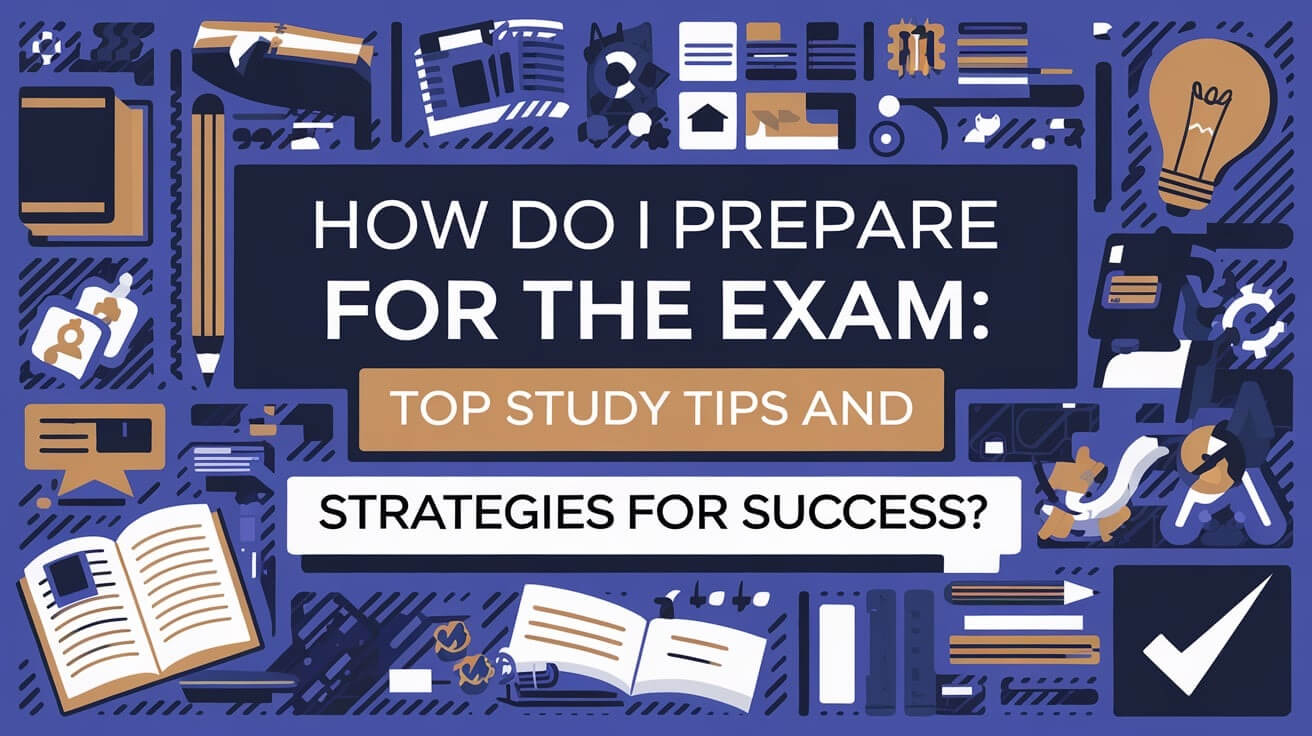
How Do I Prepare for the Exam: Top Study Tips and Strategies for Success?
Exams can feel daunting, can't they? The pressure, overwhelming material, and constant race against time can make anyone anxious. But here's the positive news: preparing for exams doesn't have to be stressful if you have the right strategies. In this blog post, we're diving into practical, actionable techniques to help you ace your exams without burning out. Whether you're looking for time management tips, study techniques, or ways to manage stress, we've got you covered. Let's get started!
Effective Study Techniques
Active Recall and Spaced Repetition
Have you ever read a chapter only to forget most of it by the next day? This is where active recall and spaced repetition can change the game.
- Active Recall: This is about actively trying to remember information rather than passively reading. Think of it as quizzing yourself. For example, after reading a section, close the book and try to recall key points without looking. It's like training your brain to retrieve information, making it more robust with each attempt.
- Spaced repetition: Instead of cramming the night before, spread your study sessions over several days. This technique helps you store information in long-term memory. For instance, review your notes after one day, then again after three days, and once more after a week. Various research data have shown that this method significantly improves retention.
Pro Tip:
Use flashcards with apps like Anki for spaced repetition. It's a beautiful way to make learning more interactive and fun.
Note-Taking Strategies
Not all note-taking methods are created equal. Here are some effective ones:
- Cornell Note-Taking Method: Divide your page into three sections—notes, cues, and summary. Write detailed notes during class, jot down critical questions in the cue column, and summarize each page of notes. This format makes review time more effective.
- Mind Mapping: Ideal for visual learners, mind maps help organize information non-linearly. Draw a central idea and branch out related concepts. This technique is perfect for complex subjects where seeing the connections between ideas helps.
Using these methods helps you stay organized and revise a breeze, especially during those last-minute cramming sessions.
Practice tests and group studies
- Practice Tests: Take timed practice tests to simulate exam conditions. This familiarizes you with the format and highlights areas to focus on.
- Group Study vs. Solo Study: Group study sessions are excellent for discussing complex topics and testing each other. However, they should be balanced with solo study time for deep focus.
Real-Life Tip: Mix solo and group study. Use solo time for learning and group sessions for review.
We are managing time for exam preparation.

Creating a Study Schedule
The key to a compelling study is a well-structured schedule. Here's how you can create one:
- Step 1: List All Subjects: Write down all subjects you must study. Then, break them into smaller topics.
- Step 2: Prioritize: Start with topics you find most challenging. This way, you can tackle difficult areas when your energy levels are highest.
- Step 3: Allocate Time: Use tools like Google Calendar or physical planners. Set aside 1-2 hours per subject, with breaks in between, to avoid burnout.
A good rule of thumb is the 50/10 rule—study for 50 minutes, then take a 10-minute break.
The Pomodoro Technique
Struggling with concentration? The Pomodoro Technique is here to help:
- How It Works: Study for 25 minutes (one "Pomodoro"), then take a 5-minute break. After four Pomodoros, take a longer (15–20-minute) break. It's a beautiful way to keep your focus sharp.
- Why It's Effective: It breaks down large tasks into manageable chunks, helping you stay focused and reducing procrastination.
This technique is beneficial when you're feeling overwhelmed by a vast syllabus.
Time Management Tips for Exams
- Use a Timer: Time yourself for each topic. This will make you accountable and ensure you spend only a short time on one subject.
- Tackle hard subjects. First, Start with the most challenging issues when your mind is fresh. This ensures you avoid them only once it's too late.
- Daily Review Sessions: Spend 10-15 minutes reviewing what you learned daily. This small habit reinforces your learning over time.
Reducing Exam Stress
Breathing exercises and mindfulness
We all know the feeling—heart racing, sweaty palms, and mind going blank right before an exam. Here's how to stay calm:
- Box Breathing: Breathe in for 4 seconds, hold for four, exhale for four, and have again for four. Repeat this a few times to calm your nerves.
- Mindfulness Practices: Spend 5 minutes focusing on your breath or listening to a guided meditation. Apps like Headspace or Calm can be your best friends during stressful times.
These simple practices can significantly reduce anxiety, helping you focus better on your studies.
Importance of Sleep and Nutrition
Did you know that sleep can boost your memory? Here's why it's essential:
- Sleep's Role in Retention: During sleep, your brain processes and consolidates information. Aim for at least 7–8 hours of rest, especially before exams.
- Brain-Boosting Foods: Fuel your body with foods rich in omega-3 fatty acids, such as fish, flaxseeds, and walnuts. Also, hydrate well with plenty of water and green tea.
Pro Tip: Avoid caffeine after 3 p.m. It can interfere with your sleep, making retaining what you've learned harder.
Setting realistic goals
- SMART Goals refer to specific, measurable, achievable, relevant, and time-bound goals. For example, "I will complete three math chapters by Friday."
- Track Progress: Use a checklist to monitor your daily achievements. This will motivate you as you see your progress.
Setting and achieving small goals builds momentum and enhances your confidence as the exam date approaches.
Common exam mistakes to avoid.

Procrastination: Why It Happens and How to Beat It
Procrastination often stems from feeling overwhelmed or fear of failure. Here's how to beat it:
- Break Down Tasks: Divide your study material into small, bite-sized chunks. Instead of "Study Biology," try "Read Chapter 3 of Biology."
- Use Accountability Partners: Having a study buddy can help keep you on track.
Cramming vs. Spaced Study
- Why Cramming Fails: Cramming overloads your brain, making it harder to retain information, leading to stress and sleepless nights.
- Benefits of Spaced Study: Reviewing material over time makes you more likely to remember it when it counts.
Case Study: Sarah, a high school student, shifted from cramming to spaced repetition and improved her grades significantly within one semester.
Conclusion:
Preparing for exams is easy if you have the right tools. You can confidently approach exams by using active recall, managing time effectively, and caring for your mental well-being. Consistency is key—start early, stay focused, and trust your efforts. You've got this!
Now it's your turn! Start applying these study strategies today and watch your confidence grow. If you found this guide helpful, share it with your friends preparing for exams. Let's ace those tests together!
Key Takeaways:
- Use active recall and spaced repetition for better retention.
- Create a study schedule and manage time with techniques like Pomodoro.
- Practice mindfulness and maintain a balanced diet for optimal focus.
- Avoid cramming, and start early for consistent progress.
FAQs:
How many hours should I study for an exam?
Aim for 2-3 focused hours daily, with regular breaks for the best results.
What is the best time to study for exams?
The morning or late evening is best, depending on when you feel most alert.
How can I improve my total concentration while studying?
Use the Pomodoro Technique and minimize distractions around you.
Is group study practical for exam preparation?
Yes, for discussion and testing each other's knowledge, but balance it with solo study for deep focus.
What should I do if I feel too stressed during exam preparation?
Try breathing exercises, stay hydrated, and break your study material into smaller parts.
Study Tips Students

